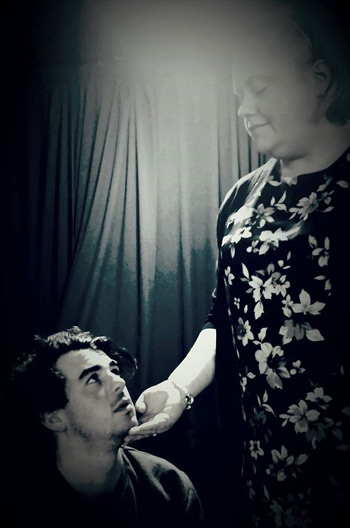
| HOME |
| NERVE |
| REVIEWS |
| ARCHIVE |
| EVENTS |
| LINKS |
| ABOUT US |
| CONTRIBUTORS |
| BACK ISSUES |
| CONTACT US |
Doctor Faustus
 Presented
by Burjesta
Theatre
Presented
by Burjesta
Theatre
A J.J. Bond Production
Directed by Mikyla Jane Durkan
The Casa, Liverpool
2nd November - 6th November 2015
Reviewed by Colin Serjent
This was a vibrant, offbeat and surreal adaptation by Burjesta Theatre of Christopher Marlowe's epic story, set in the 16th Century Renaissance period, despite its complex subject matters and convoluted language.
In essence, Dr. Faustus is a talented German scholar at Wittenburg, who vociferously complains about the limits of human knowledge.
He turns to magic as a means to enhance his learning prowess. He is left with a choice, after they suddenly appear, between the Good Angel and an Evil Angel. He has to choose between Christian conscience (whatever that is!) and damnation.
Faustus then learns the basics of the black arts. He summons the devil Mephostophilis. They come to an agreement, with Mephostophilis representing Lucifer. Faustus will sell his soul, in exchange for twenty-four years of power, with Mephostophilis as his servant to his every whim.
Sitting at the back of the theatre space I noticed a large glass-fronted painting on a wall became a mirror when the lights went down - this was not meant as part of the Burjesta production. Therefore by watching the play in physical form on the small stage in front of me, I could also view it to my right as if it was a 'mirror reflection,' or a reflection on life.
I was struck by the symbolism of this in connection with the story. You could conceive the false images of life as being seen through a mirror, making them even more unreal.
There were a number of impressive scenes enacted by the eleven member cast, some of whom played up to five different roles, illustrating their versatility and adaptability as actors.
Perhaps the most notable was towards the end of Act One when most of the characters perform a dance to the devil, and then Faustus asks for an exposition of the seven deadly sins, some being expressed in a very abstract nature.
There are also some very meaningful quotes within the production. For example, Faustus discovers there are nine heavens in the cosmos, but I immediately thought how many more hells are there, just on Planet Earth alone, particularly in contemporary times, where there is global conflict, mass population movements and major climate changes.
Faustus himself asks, "Where is hell?". Many, many places....
His twenty-four years of power are rapidly drawing to a close and he prepares to die. As the midnight hour of death approaches Faustus gives a final, frenzied monologue regretting his choices. It ends with him decrying what is about to happen. "Have mercy on my soul," he exclaims. At midnight the devils enter to drag Faustus away to be slain.
This ambitious production should transfer well to the bigger stage of the Unity Theatre, when it is performed there on Friday 20 November.